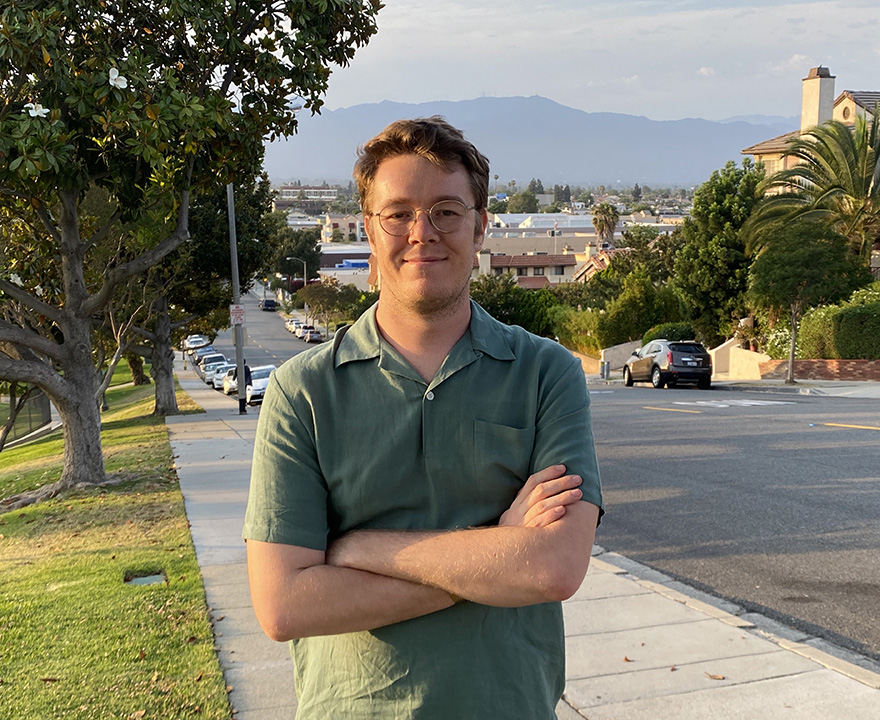Fighting for fair housing

Fighting for fair housing
- June 17, 2021
- UCI sociology Ph.D. student Steven Schmidt receives Haynes Foundation Fellowship to study housing practices in Los Angeles
-----
In October 2019, Steven Schmidt, a UC Irvine sociology Ph.D. student, began conducting interviews with renter families in Los Angeles. Whether chatting with interviewees in a local park, in the renter’s apartment, or - when the pandemic began - over the phone, he sought to understand how families navigate the housing search process.
“I’m interested in learning why they’re moving, what sort of factors influence where they end up deciding to live, and what costs they incur along the way,” Schmidt says.
After speaking with 120 families across three different neighborhoods in LA, he uncovered differences between low-income, non-Hispanic white, U.S.-born renters and low-income, Latinx immigrant renters. While both groups use their social ties to help find housing, poor white renters are more often gifted money from friends and family, have ties who co-sign leases, and are able to move quickly. Meanwhile, Latinx renters tend to incur more debt as they borrow money from friends, family, or payday lenders to cover entry costs. Additionally, Latinx renters take longer to find a home and end up in comparatively worse housing conditions when they are finally able to move.
Schmidt’s research has found that the discrepancy is due, in part, to tenant screening practices. Rental applications often require prospective tenants to provide a Social Security Number or an Individual Taxpayer Identification Number (ITIN) in order to conduct a credit or background check. They often also require tenants to show proof of income which, in some cases, can be three times the rent.
"In recent years, tenant screening practices have allowed landlords to reject the application of anyone who does not have an SSN, a prime credit score, or the minimum listed income," he says. “This elongates the housing search for many low-income Latinx immigrant families and disincentivizes renters from moving out of poor living conditions."
This month, he was awarded a $22,000 grant from the Haynes Lindley Doctoral Dissertation Fellowship to continue his interviews and compile findings for his dissertation. The Haynes Foundation supports Los Angeles-based research aimed at uncovering and addressing social problems in the city.
The work has drawn heavily upon his qualitative and quantitative research skills - skills that he’s developed and fine tuned working alongside his advisor, UCI sociology professor Kristin Turney, and her supportive, collaborative style.
“A lot of what I know about how to do a qualitative research project is because of her training, mentorship, and expertise,” Schmidt says. “I feel really lucky that I’m able to get to work with her.” Additionally, he appreciates the help and support of his committee members Rocio Rosales and Nina Bandelj, both faculty in the sociology department.
When applying to Ph.D. programs, the UCI Department of Sociology stood out for having a diverse group of scholars studying everything from immigration and education to social movements and social stratification.
“At UCI I’ve had the opportunity to explore a lot of different areas and find which path in sociology works best for me. I think that distinguishes it from other schools,” he says. “Plus the department is collaborative, supportive, and friendly.”
Over the past year, Schmidt also received teaching training as a Pedagogical Fellow (PF) at UCI. The program helped him develop best practices in the classroom which he’s put to use as an instructor for Global Sociology, an undergraduate class.
“For many students, sociology courses are the first time that they start to think about issues in their lives and in the world structurally and understand that things going on around them are the product of social systems.” He’s enjoyed helping his students open their eyes to this revelation and develop the quantitative and qualitative skills they need to conduct and evaluate research like his work in housing.
As he completes his dissertation this year, Schmidt plans to publish his findings to influence policy and change in a broken system. Specifically, he says, his work will be helpful for organizations that assist renters in Los Angeles such as Friends of the Family, an organization multiple tenants mentioned that was key in their efforts to find rentals and pay for their next security deposit.
“We think of a housing search as something that's really routine, but it’s not. My work shows how housing searches end up widening racial inequalities between low income, immigrant families who incur more costs than low income, white families who are native born U.S. citizens,” he says. “I hope my project can motivate some changes around tenant screening by illuminating how exclusionary the process is and make housing practices more equitable for all.”
-Nora Bradford for UCI Social Sciences
-----
Would you like to get more involved with the social sciences? Email us at communications@socsci.uci.edu to connect.
Share on:
Related News Items
- Careet RightUCI sociologists earn American Sociological Association honors, leadership roles
- Careet RightMultiple honors for UCI soc sci's Maricela Bañuelos
- Careet RightSoc sci shout out: Steven Schmidt, sociology Ph.D. '22
- Careet RightAttending the National Conference for Black Political Scientists
- Careet RightA lesson in solidarity


